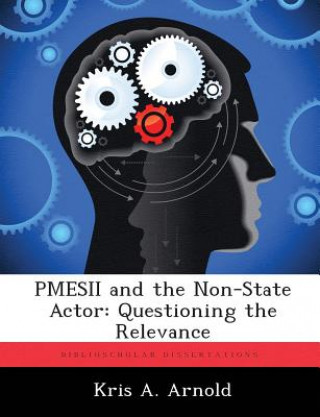
Kód: 08242243
PMESII and the Non-State Actor
Autor Kris A Arnold
A systems perspective is beginning to permeate doctrine. This perspective calls for an analysis of the key systems of an adversary. PMESII is an acronym that stands for political, military, economic, social, infrastructure, and in ... celý popis
- Jazyk:
 Angličtina
Angličtina - Vazba: Brožovaná
- Počet stran: 62
Nakladatelství: Biblioscholar, 2012
- Více informací o knize

Mohlo by se vám také líbit
-

Dune
217 Kč -

Haunting Adeline
620 Kč -

Berserk Deluxe Volume 2
1092 Kč -

White Nights
90 Kč -

Powerless
252 Kč -

Atomic Habits
483 Kč -

Dune Messiah
228 Kč -

Berserk Deluxe Volume 3
1142 Kč -

One Day
218 Kč -

Berserk Deluxe Volume 1
1115 Kč -

Iron Flame
354 Kč -

Surrounded by Idiots
303 Kč -

Harry Potter and the Prisoner of Azkaban (Minalima Edition)
993 Kč -

Gravity Falls Journal 3
440 Kč -

Heaven Official's Blessing: Tian Guan Ci Fu (Novel) Vol. 1
440 Kč -

The Creative Act
550 Kč -

Dune
204 Kč -

Hunting Adeline
642 Kč -

A Little Life
267 Kč -

Children of Dune
230 Kč -

Heaven Official's Blessing: Tian Guan Ci Fu (Novel) Vol. 2
479 Kč
Darujte tuto knihu ještě dnes
- Objednejte knihu a zvolte Zaslat jako dárek.
- Obratem obdržíte darovací poukaz na knihu, který můžete ihned předat obdarovanému.
- Knihu zašleme na adresu obdarovaného, o nic se nestaráte.
Více informací o knize PMESII and the Non-State Actor
Nákupem získáte 165 bodů
 Anotace knihy
Anotace knihy
A systems perspective is beginning to permeate doctrine. This perspective calls for an analysis of the key systems of an adversary. PMESII is an acronym that stands for political, military, economic, social, infrastructure, and information systems. Analyzing the adversary's PMESII systems can lead to the identification of key nodes, links, and vulnerabilities, which can then be targeted kinetically or non-kinetically to achieve desired effects. The PMESII systems construct applies well when the adversary is a state. All of these systems will be present, and mature, with many of them possessing tangible infrastructure, which can easily be identified by Intelligence, Surveillance, and Reconnaissance, and then targeted with precision weaponry. However, when the adversary is non-state actor, these same systems will be noticeably missing. Non-state actors are organized fundamentally different than states, and manifest themselves in completely different ways. The utility of the PMESII construct is significantly diminished when the adversary is a non-state actor. To apply the systems perspective to non-state actors, such as Al-Zarqawi, the Al Qaeda leader in Iraq, a different construct is required. The author maintains that identifying the critical requirements of non-state actors leads to a more relevant construct. The author, using the nonstate actor Zarqawi, identifies four systems that the typical non-state actor requires to remain viable. These systems are funding, recruitment, information and support, or (FRIS). The FRIS construct provides the same level of utility for the non-state actor, as PMESII does for states. The author recommends incorporating the FRIS construct as a corollary to the PMESII construct in the doctrinal manuals and publications that discuss the systems perspective.
 Parametry knihy
Parametry knihy
Zařazení knihy Knihy v angličtině Society & social sciences Education
1646 Kč
- Plný název: PMESII and the Non-State Actor
- Podnázev: Questioning the Relevance
- Autor: Kris A Arnold
- Jazyk:
 Angličtina
Angličtina - Vazba: Brožovaná
- Počet stran: 62
- EAN: 9781288301720
- ISBN: 9781288301720
- ID: 08242243
- Nakladatelství: Biblioscholar
- Hmotnost: 127 g
- Rozměry: 246 × 189 × 3 mm
- Datum vydání: 15. November 2012
Osobní odběr Praha, Brno a 12903 dalších
Copyright ©2008-24 nejlevnejsi-knihy.cz Všechna práva vyhrazenaSoukromíCookies



 Vrácení do měsíce
Vrácení do měsíce 571 999 099 (8-15.30h)
571 999 099 (8-15.30h)